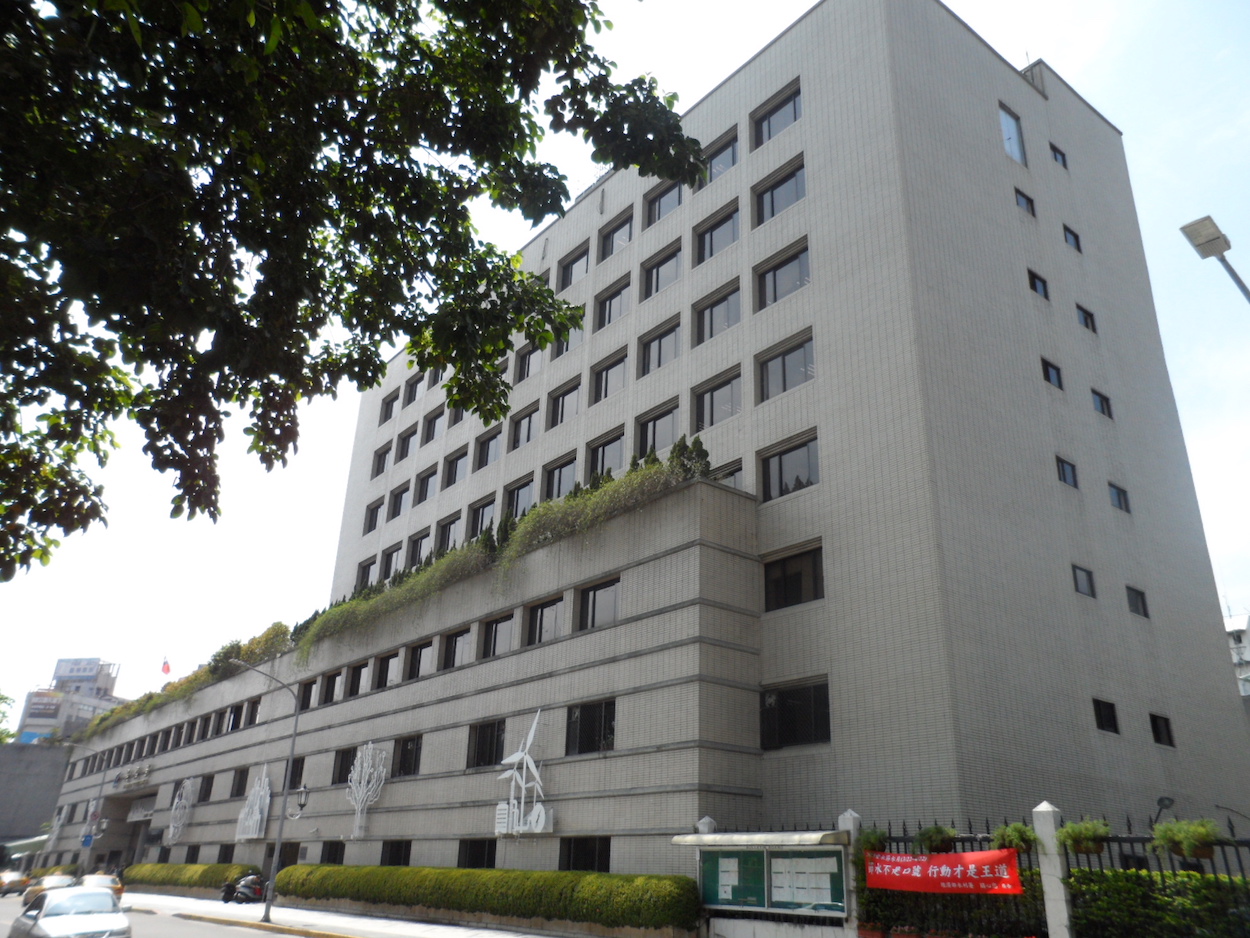by Brian Hioe
語言:
English
Photo Credit: Pfry19855/WikiCommons/CC
MINISTER OF HEALTH and Welfare Chen Shih-chung and the Central Epidemic Command Center (CECC) reported 323 new cases of COVID-19 today. 321 cases were instances of domestic transmission, while two cases were imported. Two deaths were also reported, bringing Taiwan’s death toll from the COVID-19 pandemic to seventeen. Worryingly, the deaths repeated the same pattern of cases only confirmed for COVID-19 post-mortem, while individuals were self-isolating after being tested.
However, Chen also reported that with a backlog of COVID-19 cases that have not yet been processed, the CECC was able to make progress on getting through 10,400 tests in the backlog yesterday. This added four hundred cases to the past week between May 16th and May 22nd. The majority of unprocessed tests are in Taipei and New Taipei, with test processing occurring faster outside of the two Taipeis.
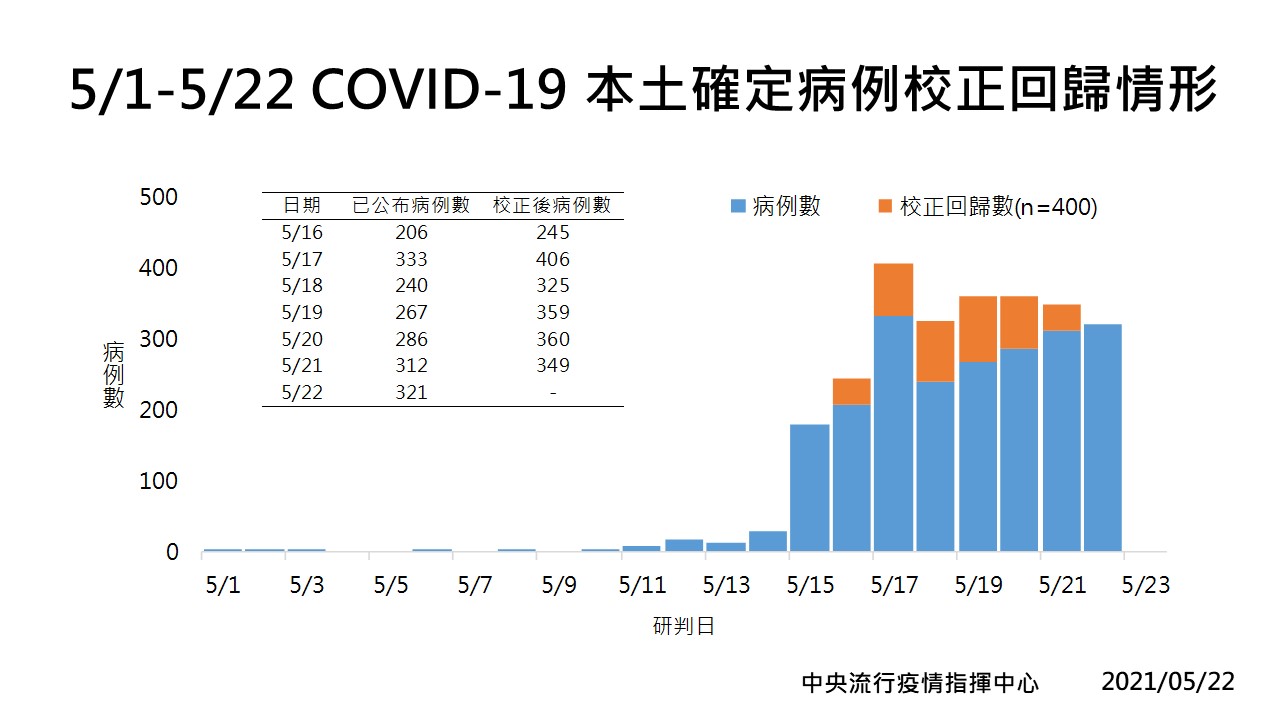 Chart showing the revised case numbers for the past week, with the newly processed backlog. The new numbers show a decline from the peak of May 17th, while the old numbers showed progressively increasing cases. Photo credit: Ministry of Health and Welfare/Facebook
Chart showing the revised case numbers for the past week, with the newly processed backlog. The new numbers show a decline from the peak of May 17th, while the old numbers showed progressively increasing cases. Photo credit: Ministry of Health and Welfare/Facebook
Local area counts for the 321 new cases today and the 400 cases from the backlog were announced together. This was 340 cases in New Taipei, with 103 cases from Banqiao, 269 cases in Taipei, with 174 from Wanhua, 20 cases in Taoyuan: 11 cases in Taichung, nine cases in Keelung, five cases in Pingtung, four each in Changhua County and in Kaohsiung City, three cases each in Hsinchu City, Hualien, and Yilan, two cases in Hsinchu city, and one cases each in Miali, Nantou, Tainan, and Yunlin.
258 total cases were linked to places in Wanhua, with 100 linked to tea parlors in Wanhua. Three new cases were linked to a family of grape sellers that sold their produce in Wanhua but live in Keelung. 80 cases had other causes, while 121 cases are of unknown origin.
Chen emphasized at the press briefing that media outlets should not report on the number of new cases as a daily jump of 700 cases, though it would not be surprising if often sensationalist Taiwanese media attempts to do so—notably, even the English-language edition of the state-run Central News Agency claimed a jump of 700 cases, though it’s Chinese-language edition did not have such issues. Apple Daily headlines have suggested Chen was “hiding information,” as have pan-Blue politicians, despite that Chen publicizing cases from the backlog is revising past information with more correct statistics.
Consequently, Chen emphasized looking at overall trends, rather than fixating on daily case numbers that could be subject to revision. The overall rate of infection at testing sites has decreased from a peak of 6.3% on May 15th to 2.9% yesterday, with the rate of infection hovering around 2.8% or 2.9% for the last five days.
It should be kept in mind that the new data can be subject to revision as well and that the release of new data should force reevaluations of previous analyses. For example, although today cases were again in the 300s, if new numbers from the backlog do not lead today’s numbers to be revised, today actually had the lowest number of cases since the peak of May 17th. The new numbers, in fact, show an overall decline since May 17th and not continuously increasing numbers as the old ones did. But, either way, one-day shifts in daily case numbers are not significant in evaluating the overall outlook for Taiwan’s current outbreak at present. Again, testing only captures part of the overall situation and so more accurate data should lead to rethinking previous conclusions.
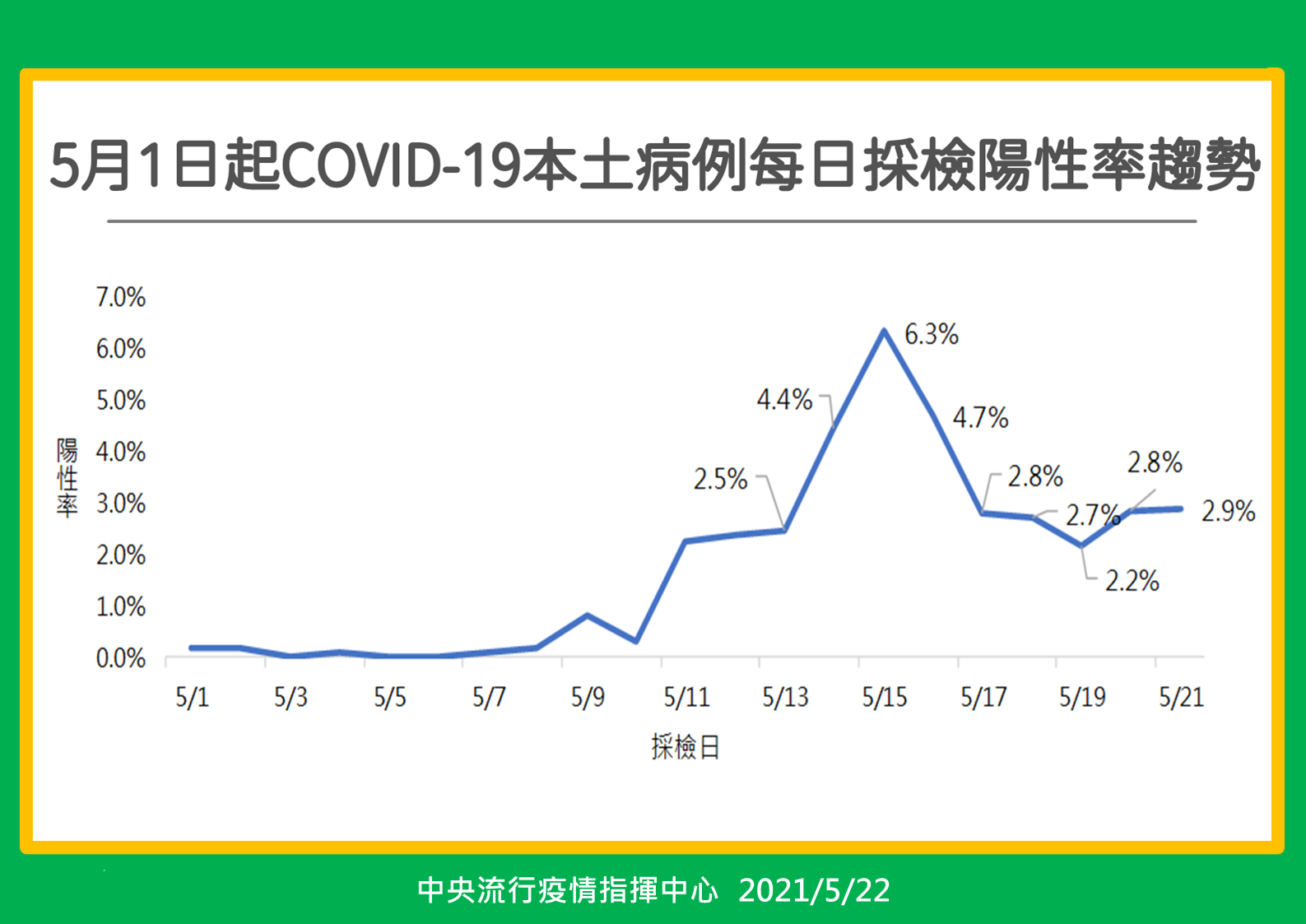 Chart showing the daily infection rate at testing sites. Photo credit: Ministry of Health and Welfare/Facebook
Chart showing the daily infection rate at testing sites. Photo credit: Ministry of Health and Welfare/Facebook
There remain over 3o,000 tests that have not been processed, so one expects future numbers to be subject to change. Nonetheless, one can expect a round of attacks from media outlets and politicians on Chen from individuals who probably never realized that there was a backlog of tests to begin with.
It is to be expected that this will feed into the rising amount of misinformation and disinformation about COVID-19 circulating in Taiwan. There will be attempts to claim that the CECC revises numbers at will and that its statistics—or policy directives—cannot be trusted. This is contributed by poor understanding in the media of measures taken by the CECC, even standard practices—or deliberately ignorance in order to allow for sensationalist headlines.
After all, testing is not the actual numbers of COVID-19 cases, but only ever an attempt to figure out those numbers through tests and metrics. As a result, numbers are changed because of new, more accurate data, paradoxically that leads to greater distrust of the statistics to begin with, which were mistaken for an objective measure of reality. As such, apart from claims that the new numbers show the unreliability of CECC data, it would not be surprising if Chen is next accused by the pan-Blue camp of faking data, to make it appear as though trends indicate that cases are on the decline. Otherwise, the DPP may be accused of faking past data in order to avoid the necessary conditions that would lead to a lockdown in the near future.
Indeed, reports in media ahead of time today suggested that Taiwan would see an uptick of cases compared to yesterday, with the Apple Daily suggesting over 400 cases. This was based on the New Taipei city government publicizing the sixteenth death to take place because of COVID-19, with reporters noticing that his assigned case number was significantly higher than the case numbers publicized yesterday.
Case numbers are not assigned due to the number of confirmed cases, but on the basis of contacts with COVID-19 cases, so this case number does not necessarily indicate an uptick in cases. Yet this did not prevent wild speculation in Taiwanese media, which should already be aware that this is the CECC’s standard practice for assigning case numbers. This is one example of the sensationalism of Taiwanese media leading to inaccurate reports.
Moreover, the CECC has emphasized that it alone has the authority to announce the number of new cases per day at its press briefing, but city governments are informed ahead of time about numbers. Local governments releasing information on the number of cases before the 2 PM press briefing may be a sign of friction between the central and local governments. This is likely to be the case with Taipei and New Taipei, which have the highest number of cases, and who are controlled by non-DPP mayors.
Taipei mayor and TPP chair Ko Wen-je’s antagonisms with the Tsai administration are well known, due to anger over the DPP not endorsing him in 2018 mayoral elections. But unlike other members of the KMT, New Taipei mayor Hou You-yi has stressed cooperation with the CECC and the central government, due to being unusually close with the Tsai administration in past months—Hou likely realizes the poor outlook for the KMT if he stays with the party. It is also noteworthy that the DPP tried to recruit Hou to the party before he joined the KMT, despite his checkered political history during the authoritarian era. That being said, it might be politically expedient for Hou to break from the central government at present.
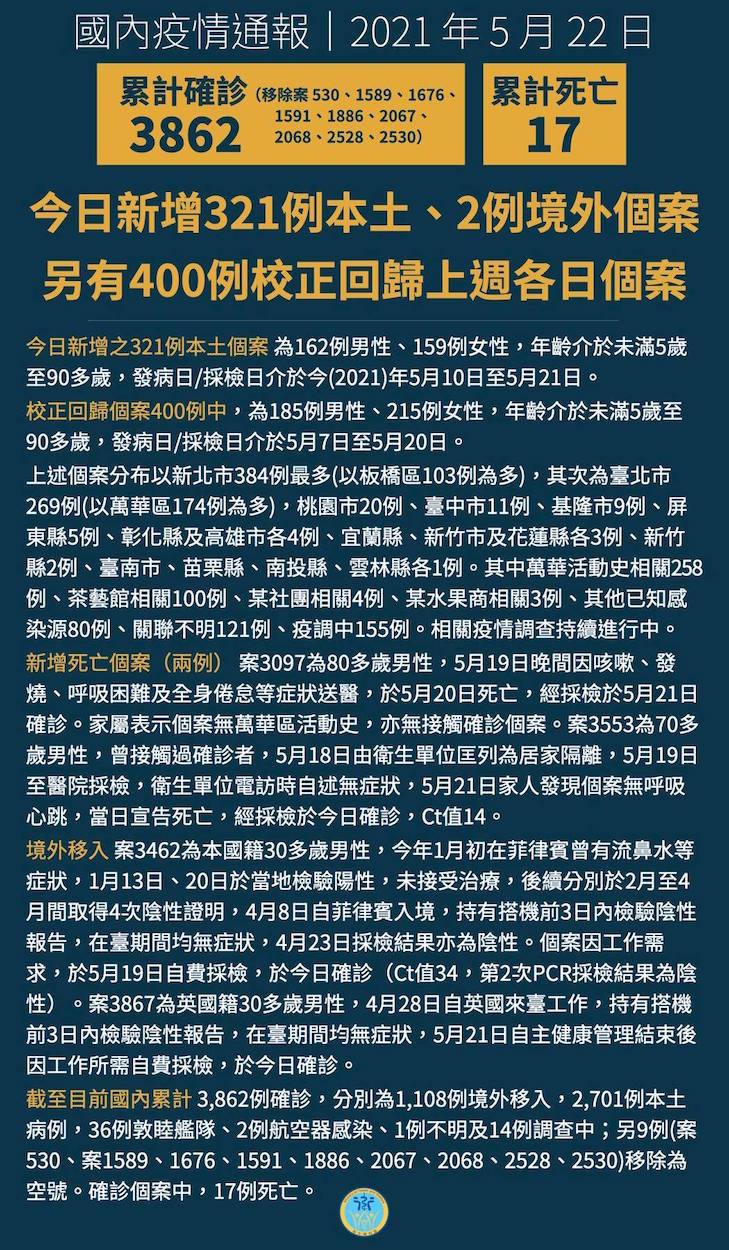 Infographic released by the Ministry of Health and Welfare. Photo credit: Ministry of Health and Welfare/Facebook
Infographic released by the Ministry of Health and Welfare. Photo credit: Ministry of Health and Welfare/Facebook
New Taipei often sees the highest number of cases per day, but has comparatively lacking medical resources to Taipei in some aspects, such as expanding testing capacity from 200 to 600 per day, while Taipei can carry out more than 1,000 tests per day.
With local governments having pushed against CECC policy orders in the past week, it is to be seen if today’s revised case numbers furthers the split between local governments and the CECC, with local governments alleging that the CECC cannot be trusted.
Indeed, Chen again called on local governments to fall in line with the central government’s orders today, stating that the CECC was overseeing efforts to boost the number of quarantine facilities and expand testing, while medical supplies of N95 masks, PPE, and other medical supplies are sufficient—but that the CECC would manage the distribution of medical resources around Taiwan and that local governments should not try and hog resources.
The army will be deployed to assist with distribution of medical resources when needed. Efforts are being made to speed up processing the backlog, as well as reducing the time lag for individuals confirmed with COVID-19 receiving information about next steps, or being allocated beds in quarantine facilities, by integrating information with the National Health Insurance system.
The CECC is still working on setting up specialized hospitals to treat COVID-19 patients, with plans also to set up quarantine facilities exclusively devoted to COVID-19 patients with mild symptoms. According to the CECC, there are currently 2,555 empty beds of those allocated to COVID-19 patients and 38 empty negative pressure rooms in Taipei and New Taipei, with hospitals currently clearing out rooms because of a wave of patients due to be released on Monday.
The Ministry of Economic Affairs. Photo credit: Chongkian/WikiCommons/CC
Minister of Economic Affairs Wang Mei-hua was present at today’s CECC press conference. Wang called for businesses raising the proportion of personnel allowed to work at home from one-third to one-half, with key personnel remaining in the office, according to the needs of industry.
Wang stated that the Ministry of Economic Affairs was in dialogue with key industries to Taiwan, such as the semiconductor industry, and that it had set up a coordination mechanism and created guidelines for industry. Which staff members are allowed to work from home will depend on the needs of the industry, such as personnel requirements to oversee production lines remaining in operation.
To this extent, some cities have announced suspension of indoor services in restaurants, including Taichung and Kaohsiung. In other places, though no suspension has been announced, restaurants unable to maintain social distancing indoors have been called on to close, with many establishments announcing a shift to take-out or delivery only.
11 students at Chaoyang University in Taichung have confirmed positive for COVID-19 after a night of karaoke last week, with rapid testing show 29 positives. 800 students and workers at the university are now being tested. There continue to be reports of businesses ordered to close during the level three alert operating illegally. This includes hostels in Hengchun Township in Pingtung that have continued to take customers, with reports of local residents hearing singing and seeing barbecues, and in Kinmen and other areas, with massage parlors continuing to operate despite closing their shutters.
Otherwise videos of individuals refusing to wear masks continue to circulate in the news, such as a confrontation between a woman at the Guting MRT and station staff. Fines are being handed out in areas with low numbers of cases so far, such as Nantou. More controversially, a man who was not wearing a mask while eating in his business was fined for violating current measures that specify wearing a mask while outside of home, though no customers were around at the time.
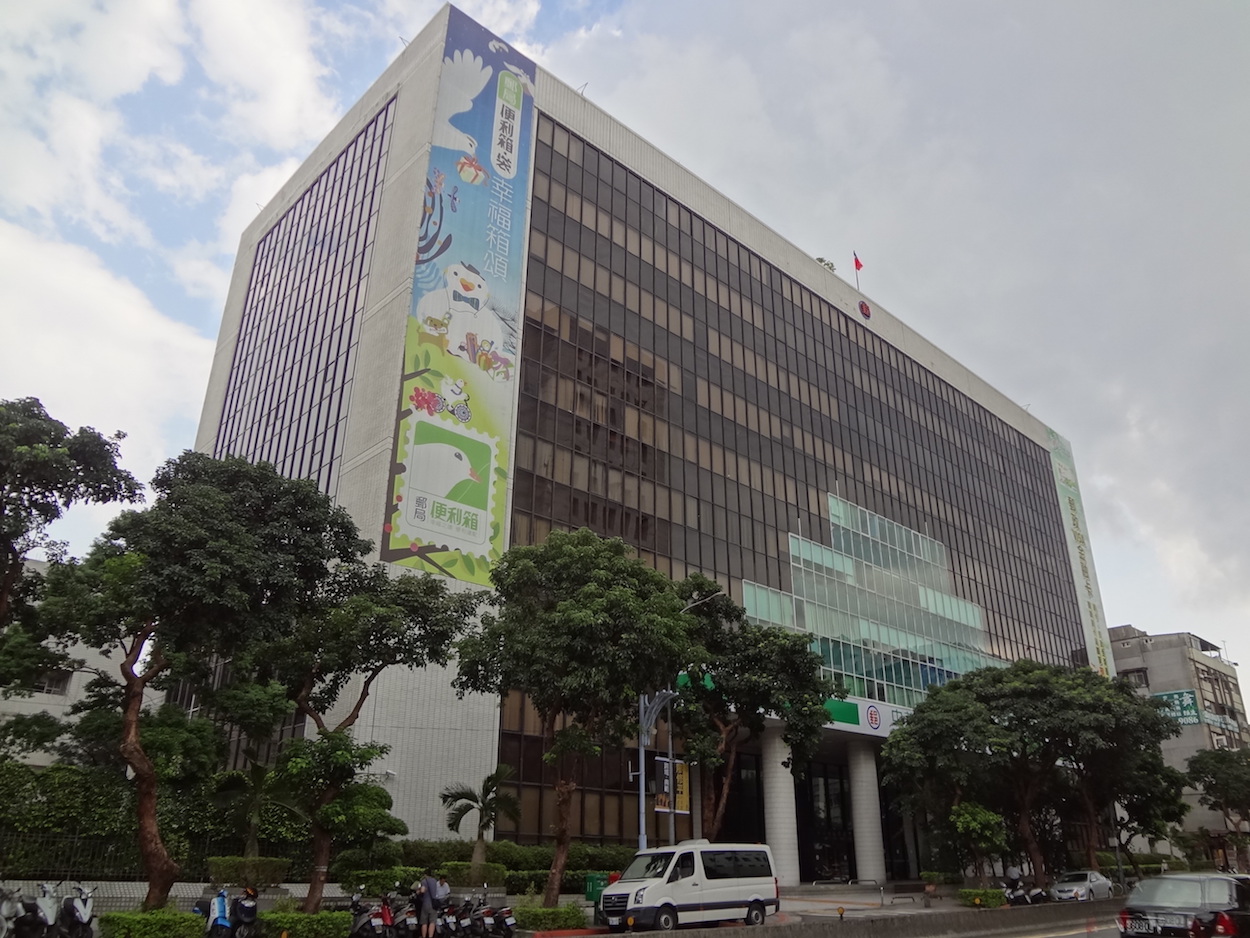 Photo credit: Solomon203/WikiCommons/CC
Photo credit: Solomon203/WikiCommons/CC
With concerns that a COVID-positive man who traveled from Keelung to Wanhua tea houses by train for 29 consecutive days between April 17th and May 12th could spread the infection, Keelung mayor Lin Yu-chang has stated that the man’s contacts were relatively limited. Likewise, there have been fears about a tour group of forty that traveled from Tainan to northern Taiwan and stayed in a hotel, who have not displayed any systems. With their self-health management period set to end, they were tested for COVID-19 on the last day of their self-health management period in what was seen as a break from previous policy on testing. The Tainan Public Health Bureau has stated that this is in accordance with the wish of local residents.
A worker at the Hanzhong Branch Office of the Chunghwa Post in Wanhua have turned out to be positive for COVID-19, with two other workers still waiting for the results of their testing. There are currently three workers at the Chunghwa Post that have tested positive for COVID-19, including a worker in their archives, and working in delivery services at Xinyi, raising the possibility of COVID-19 spreading among postal workers.
In public comments, former vice president Chen Jien-ren, the epidemiologist that led Taiwan’s fight against SARS in 2003, has stressed the importance of vaccinations going forward. According to Chen, this is needed to combat the increased infection rate of new strains of COVID-19. However, it is still unclear whether the US intends to allocate Taiwan vaccines as part of two pledges by US president Joe Biden to distribute 80 million vaccines and later an additional 20 million vaccines globally.
President Tsai Ing-wen urged members of the public not to go out over the weekend, if at all possible, emphasizing the necessity of this to prevent the spread of COVID-19. In the meantime, with a volunteer that helped take care of Tsai’s pet dogs at the Presidential Residence that tested positive for COVID-19, despite Tsai and staffers at the Presidential Residence and Office all testing negative, this has led to the spread of disinformation claiming that Tsai has COVID-19. This is in line with the spread of disinformation claiming that the Tsai administration is hiding the total number of COVID-19 cases in Taiwan.
Current penalties for spreading disinformation and misinformation about COVID-19 are as high as 300,000 NT. The CECC has warned of “cognitive warfare” strategies from the Chinese government, aimed at sowing distrust in the Tsai administration. Nevertheless, as can be seen with today’s attacks on Chen Shih-chung, Taiwan’s domestic media sometimes does not prove much better and is highly susceptible to become a vehicle for the spread of misinformation and disinformation, as a result of sensationalism and poor fact-checking practices, inclusive of the continuously citing posts on social media platforms as Facebook or online forums such as PTT as though they were reliable sources—even during a pandemic.


